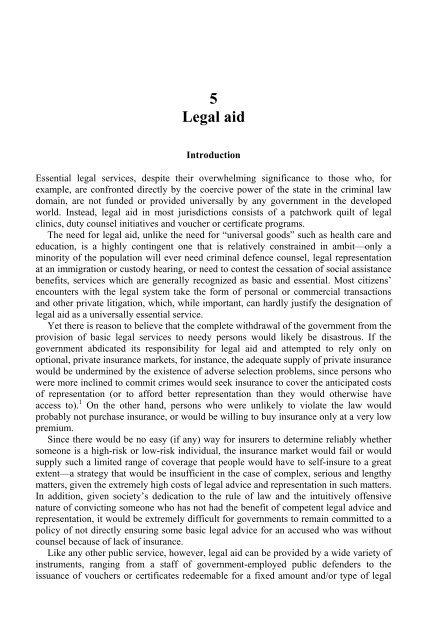Rethinking the Welfare State: The prospects for ... - e-Library
Rethinking the Welfare State: The prospects for ... - e-Library
Rethinking the Welfare State: The prospects for ... - e-Library
You also want an ePaper? Increase the reach of your titles
YUMPU automatically turns print PDFs into web optimized ePapers that Google loves.
5<br />
Legal aid<br />
Introduction<br />
Essential legal services, despite <strong>the</strong>ir overwhelming significance to those who, <strong>for</strong><br />
example, are confronted directly by <strong>the</strong> coercive power of <strong>the</strong> state in <strong>the</strong> criminal law<br />
domain, are not funded or provided universally by any government in <strong>the</strong> developed<br />
world. Instead, legal aid in most jurisdictions consists of a patchwork quilt of legal<br />
clinics, duty counsel initiatives and voucher or certificate programs.<br />
<strong>The</strong> need <strong>for</strong> legal aid, unlike <strong>the</strong> need <strong>for</strong> “universal goods” such as health care and<br />
education, is a highly contingent one that is relatively constrained in ambit—only a<br />
minority of <strong>the</strong> population will ever need criminal defence counsel, legal representation<br />
at an immigration or custody hearing, or need to contest <strong>the</strong> cessation of social assistance<br />
benefits, services which are generally recognized as basic and essential. Most citizens’<br />
encounters with <strong>the</strong> legal system take <strong>the</strong> <strong>for</strong>m of personal or commercial transactions<br />
and o<strong>the</strong>r private litigation, which, while important, can hardly justify <strong>the</strong> designation of<br />
legal aid as a universally essential service.<br />
Yet <strong>the</strong>re is reason to believe that <strong>the</strong> complete withdrawal of <strong>the</strong> government from <strong>the</strong><br />
provision of basic legal services to needy persons would likely be disastrous. If <strong>the</strong><br />
government abdicated its responsibility <strong>for</strong> legal aid and attempted to rely only on<br />
optional, private insurance markets, <strong>for</strong> instance, <strong>the</strong> adequate supply of private insurance<br />
would be undermined by <strong>the</strong> existence of adverse selection problems, since persons who<br />
were more inclined to commit crimes would seek insurance to cover <strong>the</strong> anticipated costs<br />
of representation (or to af<strong>for</strong>d better representation than <strong>the</strong>y would o<strong>the</strong>rwise have<br />
access to). 1 On <strong>the</strong> o<strong>the</strong>r hand, persons who were unlikely to violate <strong>the</strong> law would<br />
probably not purchase insurance, or would be willing to buy insurance only at a very low<br />
premium.<br />
Since <strong>the</strong>re would be no easy (if any) way <strong>for</strong> insurers to determine reliably whe<strong>the</strong>r<br />
someone is a high-risk or low-risk individual, <strong>the</strong> insurance market would fail or would<br />
supply such a limited range of coverage that people would have to self-insure to a great<br />
extent—a strategy that would be insufficient in <strong>the</strong> case of complex, serious and lengthy<br />
matters, given <strong>the</strong> extremely high costs of legal advice and representation in such matters.<br />
In addition, given society’s dedication to <strong>the</strong> rule of law and <strong>the</strong> intuitively offensive<br />
nature of convicting someone who has not had <strong>the</strong> benefit of competent legal advice and<br />
representation, it would be extremely difficult <strong>for</strong> governments to remain committed to a<br />
policy of not directly ensuring some basic legal advice <strong>for</strong> an accused who was without<br />
counsel because of lack of insurance.<br />
Like any o<strong>the</strong>r public service, however, legal aid can be provided by a wide variety of<br />
instruments, ranging from a staff of government-employed public defenders to <strong>the</strong><br />
issuance of vouchers or certificates redeemable <strong>for</strong> a fixed amount and/or type of legal


